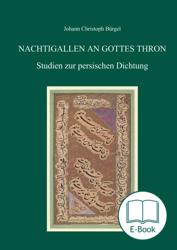Romantische Epik,
Mystik und Magie,
Musiktheorie, Wortspiel,
Sprachreflexion und Poetologie
bei Nezami, Attar, Hafez, Rumi und Sana’i -
Nachdichtungsstrategien bei Goethe, Rückert und Platen -
Stoff- und Motivübernahmen in Turandot und Tristan und Isolde.
Dieser Band vereint ausgewählte Aufsätze von Johann Christoph Bürgel aus den Jahren 1978-2008 zur klassischen persischen Literatur und ihrer europäischen Rezeption. Die durch einen Index erschlossene Aufsatzsammlung ist ein Referenzwerk für den Fachwissenschaftler und eine faszinierende Lektüre für den interessierten Laien.
To date, only a few pioneers have made classical Persian poetry and philosophy accessible to the occidental eye. During the 17th and 18th centuries, influential travellers brought goods, travelogues and translations back from Persia. Around 1800, enthusiasm for the oriental brought about more translations as well as more systematic research. In 1812, Joseph v. Hammer(-Purgstall) translated the Dīvān of Ḥāfeẓ. It is with him that Friedrich Rückert studied Persian and went on to set new standards in oriental philology and translation. Despite the tremendous contributions of the chairs in Iranian Studies which were subsequently founded in Europe, the wealth of Persian literature has hardly been exhausted.
Johann Christoph Bürgel was born in Silesia in 1931, received his doctorate in Göttingen in 1960 and was director of the Institute of Islamic Studies in Bern from 1970 to 1995. With his research method, characterised by scientific accuracy and a creative gift for language, he continued the tradition of Rückert and laid cornerstones for today’s Iranian Studies. He received numerous awards for his research as well as his translations.
This volume combines selected papers by distinguished orientalists from 1978 to 2008, dealing with Neẓāmī, ʿAṭṭār, Ḥāfeẓ, Rūmī, Sanāʾī and other Persian mystics and poets, as well as their European reception.
The Gesellschaft der Freunde islamischer Kunst und Kultur, which aims to promote the encounter with the culture of the orient, has sponsored the publication of this volume. It functions as a small compendium for the professional world and as an introduction to the many rich facets of Iranian Literary Studies for the broader public.
The topics discussed in the papers included in this volume are: romantic narrative literature, its poetic forms and social background in mediaeval Iran; puns, ambiguities and linguistic reflection in ʿAṭṭār, Ḥāfeẓ and Rūmī; poetology and rhetoric, fictionality and realism in Persian poetry; eroticism, mysticism, magic and conceptions of the soul; anthropological-philosophical music theory in Persian scholarly literature, with productive and interpretative reference to Plato and Aristotle; adaptation strategies in Goethe, Rückert and Platen, adaptation of subject matter and motifs in Turandot and Tristan and Isolde.
An index has been added in order to make this collection a reference work for professional researchers, a tool for students and a fascinating read for the interested layperson.
„Das Buch versammelt wichtige Arbeiten Bürgels und ist damit sowohl eine Einführung in sein Werk als auch ein sehr nützliches Werkzeug, um seine bahnbrechenden Arbeiten zu Nitzami, Hafis und Rumi zur Hand zu haben. Der Name "Nachtigallen an Gottes Thron" ist dabei etwas zu romantisch für die solide Hermeneutik, die Bürgel bietet. Studenten und Forscher der persischen Literatur werden für die Zusammenstellung dankbar sein und darauf aufbauen. Interessierten Lesern mit Englischkenntnissen bietet das Buch einen Zugang zu den persischen Klassikern, der in dieser Klarheit anderswo seinesgleichen sucht“
Stephan Popp
In: Wiener Zeitschrift für die Kunde des Morgenlandes, Band 105, 2015, S. 457-459.
--------------------------------------------------------------------------
„Es ist den beiden Münchner Wissenschaftler Mehr Ali Newid und Peter·Anold Mumm zu verdanken, dass nun sechzehn zentrale Studien von Bürgels Beschäftigung mit der neupersischen Literatur, die nur einen Teil seiner reichen und vielfältigen Forschungstätigkeit repräsentieren, in einem Band vereinigt sind, und so das Fachpublikum wie die interessierte Leserschaft zur genussvollen Lektüre einladen!“
In:
www.fieunde-islamischer-kunst.de/
Prof. Dr. Johann Christoph Bürgel
born in Gottesberg, Silesia in 1931. 1954 to 1960 Islamic studies at Frankfurt am Main, Ankara, Bonn, and Göttingen. 1960 PhD in Göttingen, Georg August University , thesis on the court correspondence of ’Adud ad-Daula. 1960 to 1969 Assistent to Prof. A. Dietrich at the Seminar of Arabic Studies, Göttingen, 1969 Habilitation (inauguration of university teaching career). 1970 Invitation to occupy the recently founded chair of Islamic studies at the university of Bern (coordination with Fribourg). Since then director of the chair of Islamic studies, retirement 1995. He organized several international conferences (e.g. n Contemporary Literature in Islamic Countries), lectured at various occasions in USA and Europe, stays as visiting fellow in Princeton and two weeks studies of Persian manuscripts in St. Petersburg as guest of the Russian Academy.
Main subjects of research: Arabic and Persian literature, history of Islamic culture. General scope: How did/does the Islamic religion influence the development of sciences and the fine arts, what means “Islamic culture”?
Recent major publications: “The Feather of Simurgh. The “Licit Magic” of the Arts in Medieval Islam” (New York University Press 1988), “Allmacht und Mächtigkeit. Religion und Welt im Islam” (München: C. H. Beck 1991), in cooperation with C. van Ruymbeke „A Key to the Treasure of the Hakim. Artistic and Humanistic Aspects of Nizami Ganjavi’s Khamsa“ (Leiden 2011), as well as literary translations and own lyric.
Honours and Memberships:
Iqbal-Medal of the Government of Pakistan (1978)
Rückert Award of the Town of Schweinfurt (home town of the outstanding German orientalist, poet and translator) (1983)
Literary Award of the Town of Bern (1993)


 Table of Contents
Table of Contents